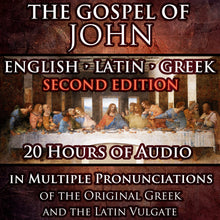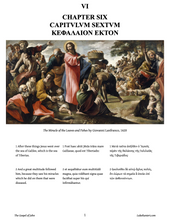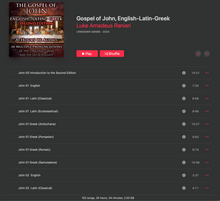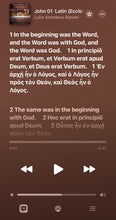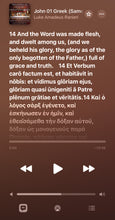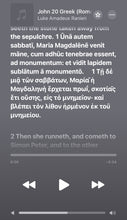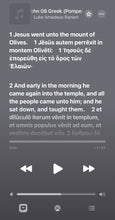
Gospel of John English-Latin-Greek Trilingual Audiobook & Macronized Text
in the SECOND EDITION (March 2024):
• Audio files of every chapter of the Gospel of John recited in English, Latin, and Greek (more than 150 audio files)
• Both Ecclesiastical and Classical Pronunciation of the Latin
• 4 Historical Pronunciation Conventions of Koine Greek (Romaic Lucian, Pompeian Lucian, Samosatene Lucian, Antiochene Lucian)
• PDF files of side-by-side translations into English and Latin next to the original Greek — the Latin and Greek are fully macronized!
My Vespāsiānī tier patrons on Patreon get this entire audiobook for free! So consider signing up to be a patron at patreon.com/LukeRanieri.
WHY THE GOSPEL OF JOHN
The Gospel of John’s original Greek text is widely regarded as being amongst the easiest to read in the New Testament, and to be composed in “good” Greek. Like other parts of the Bible, John repeats many key words and phrases, making it a great way to acquire important vocabulary. Thus the Gospel of John is an excellent vehicle to introduce us to extensive prose in the Ancient Greek Language, in addition to being a core part of Biblical literature.
While there are many ways to enjoy this audiobook, the audience I have in mind are listeners with native or strong English proficiency interested in using the English text to improve their understanding of the Latin Vulgate, and who will then in turn utilize the Latin and English translations together to achieve fluent understanding of the original Greek.
If this describes you, here is how I imagine you might use the audio material: while reading along with the PDF, listen to a chapter in English, followed by Latin, and then Greek. (The audio files have been titled so as to ensure that most music players will automatically place them in this order alphanumerically.) This will allow you to understand the text completely in English, then in Latin, followed finally by the audio of the original Gospel. Since many study Latin before attempting Ancient Greek, and as Latin has a lot in common with Ancient Greek, you may find this recommendation to be a very helpful bridging process; but I encourage you to utilize the materials in any way you find enjoyable or useful!
The text in the PDF is arranged in three columns in the same order, English-Latin-Greek, each verse clearly numbered, to allow immediate cross referencing between the three languages. While I imagine the most intensive version of this experience will be accomplished on a computer, you will likely wish to synchronize the audio files with your mobile device. To further aid you in this respect, I have attached the text of each chapter to the audio files themselves as lyrics metadata, so most will be able to visualize the text via the Lyrics feature (as it is called in the iOS Music app) while listening. (If for some reason your audio player does not show the lyrics, you can investigate ways to copy and paste the text from the PDF into each track in the application of your choice if you want this.)
N.B. The expectation is that these audio files will be downloaded on a computer, and then transferred to mobile devices through the appropriate synchronization process, such as iTunes Match and Apple Music for the Apple ecosystem. Other ecosystems may work differently.








